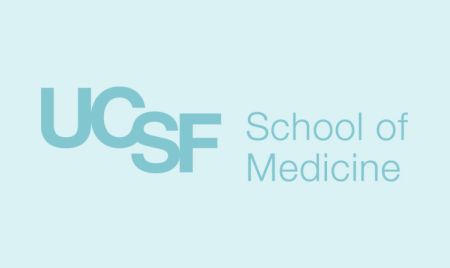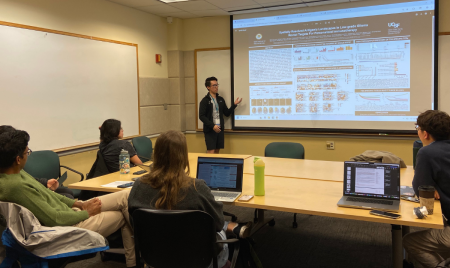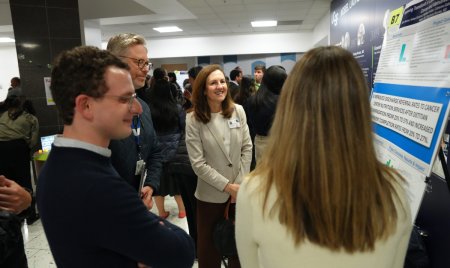New! Career Launch: The final, highly individualized phase of the Bridges Curriculum
UCSF medical students in clerkships
In March 2019, fourth-year medical students at UCSF will begin Career Launch, the final phase of the Bridges Curriculum. During this individualized component of their training, students will participate in clinical experiences and scholarly projects aligned with their career goals.
“During Career Launch, students will pursue advanced clinical training that prepares them for their chosen career paths,” says John Davis, MD, PhD, Associate Dean for Curriculum. As they conduct advanced clinical rotations for a chosen residency, ambulatory sub-internships, and scholarship relevant to a topic in health care or the domains of science, our learners will demonstrate uniquely UCSF clinical values that prepare them for careers as 21st century physicians.”
Career Launch begins with the exciting combination of two new courses, Designing and Conducting Research (DCR) and Introduction to Career Launch. Overall, it is comprised of advanced block-based clinical rotations, the Bridges longitudinal Specialty Practice Ambulatory Sub-iNternship (SPAN), Inquiry Deep Explore, and Coda. Over 61 weeks, these elements will see medical students apply and advance their knowledge of foundational sciences and their patient care and systems improvement skills as members of interdisciplinary teams.
“Dedicated time to engage in scholarly projects in one of the core domains of science is instrumental to solving today’s health care challenges,” says Dr. Davis. “After completing Career Launch, our graduates will be recognized by the way they approach patients, populations, as well as health care and health systems problems.”
Dr. Davis anticipates students will enjoy the novel elements of Career Launch, including SPAN and Inquiry Deep Explore, for example. With SPAN, it’s the first time advanced medical students will be offered this type of preceptorship specifically designed to enhance their ambulatory skills in preparation for their residency training. SPAN builds on foundational ambulatory skills they developed during their Clinical Microsystem Clerkship and FCM 110.
“Traditionally, medical school hasn’t prioritized preparing students to practice in the outpatient setting, and being in clinic is often one of the more challenging clinical experiences in residency. The goal of SPAN is to help fourth-year students enter residency training ahead of the game—prepared to see patients in the ambulatory environment,” says Kate Lupton, MD, FACP, Associate Professor of Medicine, UCSF Division of General Internal Medicine at ZSFG, and SPAN Director.
Compared to traditional longitudinal clerkships, SPAN offers students unique opportunities such as preceptor assignments based on each learner’s interests and career goals, the option to recruit their own preceptors and flexibility in scheduling to accommodate students’ schedule of rotations and electives and time away for residency interviews or Deep Explore projects.
Overall, the Deep Explore experience will enhance students’ lifelong process of challenging current concepts and creating new knowledge, or comparable scholarship.
“Inquiry Deep Explore will support students in a project that speaks to their own passions and advances the frontiers of knowledge,” says Meyeon Park, MD, Assistant Professor of Medicine and Faculty Co-Director for the new Designing and Conducting Research (DCR) course. Dr. Park is also the Associate Director of the Inquiry Funding Office, and helps students with research projects from their earliest stages.
"I am excited about this course as an important way to help students develop robust proposals to maximize their Deep Explore experience. I am personally excited to get the chance to get to know students and share the fun of new research endeavors," says Dr. Park.
Career Launch: The Basics
Career Launch is bookended with two curricular courses, Introduction to Career Launch (ICL) and Coda.
ICL, a new component of Career Launch, will feature advanced training in important clinical skills such as communication, functioning in interprofessional teams, and managing urgent/emergent situations.
“These skills will be useful in the 12 weeks of advanced core block rotations that include four weeks of a medicine subinternship, four weeks of a student’s chosen specialty subinternship, and a new requirement for four weeks of an emergent or urgent care experience,” says Bradley Monash, MD, Associate Chief of the Medicine Service, and Assistant Clinical Professor of Internal Medicine and Pediatrics. Dr. Monash also serves as the Site Director at Moffitt-Long Hospital for the UCSF Internal Medicine Residency, and as Co-Director of Coda, the three-week capstone course for graduating UCSF medical students.
Coda prepares students for their transition to residency, by summarizing and reviewing the most important clinical information necessary for internship.
“As a whole, the Bridges Curriculum exemplifies the School of Medicine’s approach to continually innovate and creatively design undergraduate medical curricula to meet the changing demands of medical education,” says Dr. Davis. “Career Launch, with its embedded flexible, individualized, and competency-based educational opportunities, illustrates such effort as we deliver high-yield preparatory courses and a capstone medical school experience to our talented students. I am tremendously excited to see what great heights they will soar to in their careers as UCSF-educated physicians!”









